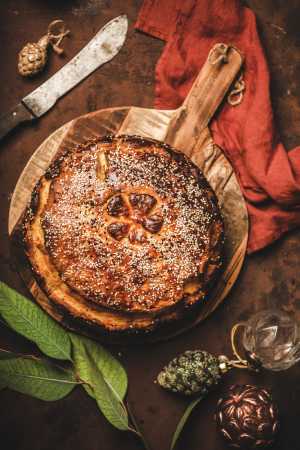Christmas in Cyprus is celebrated with a rich blend of religious traditions, family gatherings, and festive foods, reflecting the island’s deep Christian Orthodox heritage and Mediterranean culture. Christmas celebrations in Cyprus generally begin on December 24th and extend through to the New Year. Here’s a look at how Christmas is traditionally celebrated in Cyprus:
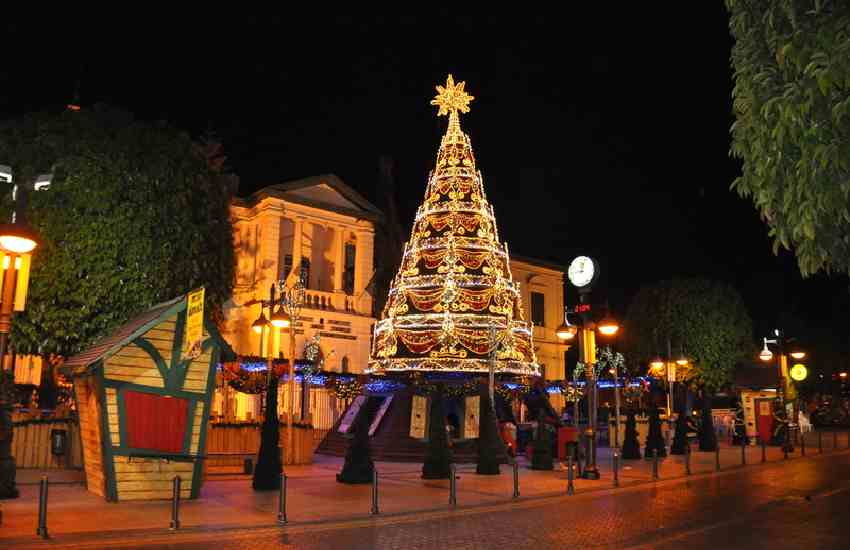
1. Religious Observances
As a predominantly Orthodox Christian country, Christmas in Cyprus is deeply rooted in religious traditions. The holiday is centered around the birth of Jesus Christ, and many families observe the Nativity Fast (a period of fasting leading up to Christmas) as part of their religious preparation.
Christmas Eve: The celebrations often begin on Christmas Eve, with many Cypriots attending the Midnight Mass at church. The service, which includes hymns, prayers, and the reading of the Nativity story, is an important part of the religious observance. Families typically gather at church to celebrate the birth of Christ, marking the start of Christmas Day.
Christmas Day: Christmas Day is a more relaxed day, often spent with family. Many Cypriots attend church again in the morning for a shorter service and then head home to continue the celebrations.
2. Feasts and Special Foods
Food plays a significant role in Christmas celebrations in Cyprus, with many traditional dishes served to mark the occasion. The holiday meals reflect both local Cypriot cuisine and regional Mediterranean influences.
Vasilopita: A special New Year’s cake, Vasilopita, is baked to celebrate the feast of Saint Basil the Great (on January 1st). The cake contains a hidden coin, and the person who finds it in their slice is said to have good luck for the year.
Sweets: Cyprus is known for its rich array of traditional sweets, many of which are enjoyed at Christmas. Koum kue (Cypriot Christmas sweets) are a must, including melomakarona (honey-soaked cookies with walnuts) and kourabiedes (powdered sugar-coated butter cookies). These sweets are often served to guests during the holiday season.
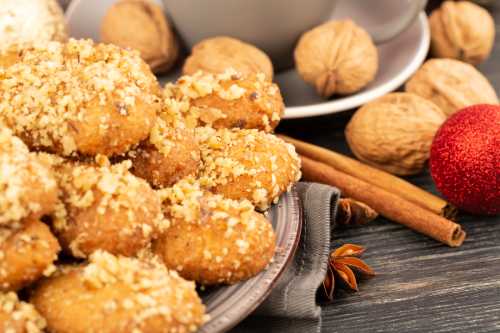
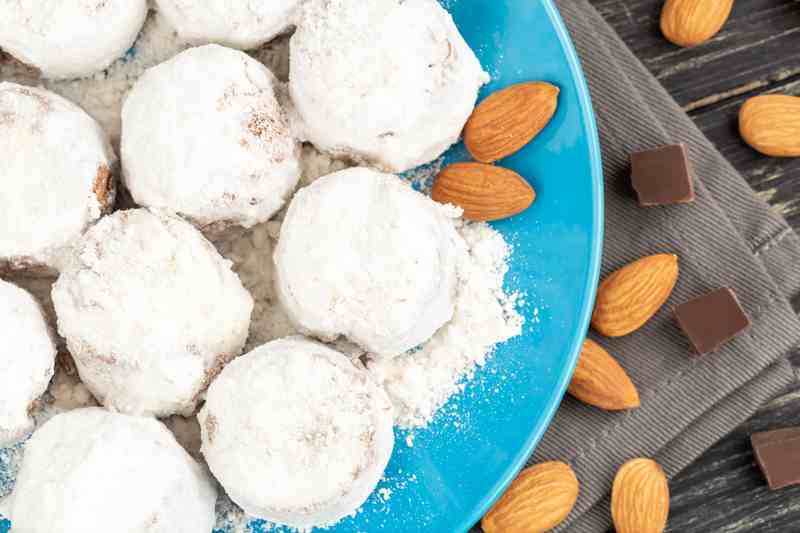
Christmas Dinner: The Christmas meal is typically a large, festive family affair. Souvla (large pieces of meat, usually pork or lamb, cooked on a spit) is commonly served, along with other dishes such as moussaka, stuffed vine leaves, and roasted vegetables.
Halloumi: This famous Cypriot cheese is often included in Christmas feasts, either served grilled or as part of a meze platter.
3. Christmas Decorations
While decorations have become more modern in recent years, Cypriots still retain some traditional Christmas customs in their homes.
The Christmas Tree: Like many other countries, Christmas trees have become an essential part of the holiday decorations in Cyprus. Homes and public spaces are adorned with sparkling lights, ornaments, and festive decorations. In recent years, more homes also feature artificial trees, although some still prefer the real ones.
Karakoi (Kallikantzaroi): In Cyprus, one of the more unique Christmas traditions involves the Kallikantzaroi, mischievous little goblins or evil spirits believed to come out at Christmas. Traditionally, families would place a log or a piece of wood, called a “Yule log,” in the fire to keep the spirits away. While the tradition is not as widely practiced today, you may still hear stories of these creatures during the Christmas season.
Decorative Lights: Homes and villages, especially in the larger towns, are often beautifully decorated with lights. Many villages and towns hold Christmas markets and public events where the streets are lit up, creating a festive atmosphere.
4. Caroling (Kalanda)
One of the most charming Christmas traditions in Cyprus is the singing of Kalanda (Christmas carols). Groups of children often go door-to-door, singing traditional songs in exchange for small gifts, usually money or sweets. These carolers may also be accompanied by instruments like tambourines or triangles.
Kalanda Songs: These carols are not only a part of the Christmas tradition but also have a religious and festive significance. The lyrics usually talk about the birth of Christ, blessings for the household, and wishes for prosperity in the new year.
5. Gift-Giving
While the primary focus of Christmas in Cyprus is on the religious and family aspects, gift-giving is also an important part of the celebration. However, gifts are usually exchanged on New Year’s Day, which is also the feast of Saint Basil the Great. Many Cypriot children will receive gifts from Agios Vasilis (Saint Basil), the Greek equivalent of Santa Claus, who is believed to bring presents on the first day of the year. This is different from the Western tradition of exchanging gifts on Christmas Day.
6. The Role of Saint Basil (Agios Vasilis)
Unlike Western Santa Claus, who comes on Christmas Eve, Agios Vasilis (Saint Basil) brings gifts to children on New Year’s Day in Cyprus. Saint Basil, known for his acts of charity, is a central figure in Greek Orthodox tradition. On the eve of New Year’s Day, families will often prepare for his arrival with festive meals, and children may leave out shoes or stockings in hopes of receiving gifts.
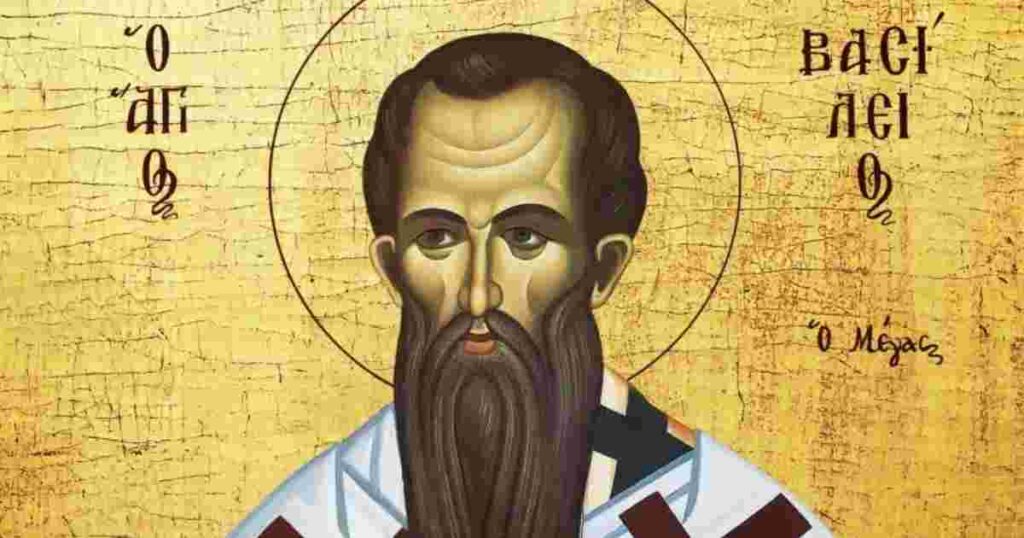
7. Celebrations Extend to New Year’s and Epiphany
In Cyprus, Christmas celebrations don’t end on December 25th. The holiday season continues into New Year’s Day (January 1st), which is marked by the celebration of Saint Basil. This is when many families exchange gifts, and people also prepare to attend church to commemorate Saint Basil’s life and charitable works.
The season culminates with Epiphany on January 6th, a significant religious event that celebrates the baptism of Christ. On this day, the Blessing of the Waters takes place, where priests throw a cross into the sea, rivers, or lakes, and young men dive into the water to retrieve it. It is believed that whoever retrieves the cross will have good luck for the year.
8. Community and Family Focus
Above all, Christmas in Cyprus is a deeply communal and family-centered celebration. It is a time when families gather for big meals, share stories, and enjoy one another’s company. Visiting friends, family, and neighbors is common, and there is an emphasis on generosity and hospitality, which are hallmark qualities of the Cypriot culture.
Christmas in Cyprus is a blend of religious devotion, family traditions, delicious food, and festive cheer. While influenced by Orthodox Christianity, the holiday celebrations are deeply rooted in Cypriot culture and history. From attending Midnight Mass to enjoying a big family feast, from singing traditional carols to receiving gifts from Agios Vasilis, Christmas in Cyprus is a joyful occasion marked by warmth, togetherness, and community spirit. Whether you’re celebrating at home with family or enjoying the vibrant festivities in the streets, Christmas in Cyprus is truly a time for creating lasting memories.









